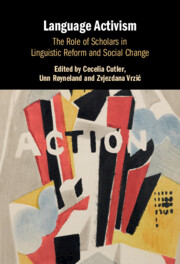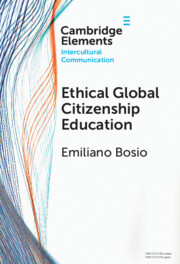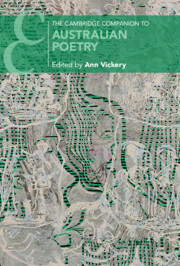Refine search
Actions for selected content:
9 results

Language Activism
- The Role of Scholars in Linguistic Reform and Social Change
-
- Published online:
- 31 May 2025
- Print publication:
- 06 February 2025
1 - Introduction
-
-
- Book:
- Language Activism
- Published online:
- 31 May 2025
- Print publication:
- 06 February 2025, pp 1-12
-
- Chapter
-
- You have access
- HTML
- Export citation

Ethical Global Citizenship Education
-
- Published online:
- 03 December 2024
- Print publication:
- 12 December 2024
-
- Element
- Export citation
12 - Lionel Fogarty’s Poetics of Address and the Negative Lyric
- from Part III - Authors
-
-
- Book:
- The Cambridge Companion to Australian Poetry
- Published online:
- 06 June 2024
- Print publication:
- 13 June 2024, pp 197-216
-
- Chapter
- Export citation

The Cambridge Companion to Australian Poetry
-
- Published online:
- 06 June 2024
- Print publication:
- 13 June 2024
4 - Critical Methods
- from Part I - Methods of Comparative Law
-
-
- Book:
- The Cambridge Handbook of Comparative Law
- Published online:
- 26 January 2024
- Print publication:
- 01 February 2024, pp 48-71
-
- Chapter
- Export citation
23 - Distortions in the Last Frontier
- from Part VI - Global Metal
-
-
- Book:
- The Cambridge Companion to Metal Music
- Published online:
- 31 August 2023
- Print publication:
- 14 September 2023, pp 330-343
-
- Chapter
- Export citation
Reproductive Justice Beyond Borders: Global Feminist Solidarity in the Post-Roe Era
-
- Journal:
- Journal of Law, Medicine & Ethics / Volume 51 / Issue 3 / Fall 2023
- Published online by Cambridge University Press:
- 13 December 2023, pp. 606-611
- Print publication:
- Fall 2023
-
- Article
-
- You have access
- Open access
- HTML
- Export citation
12 - Decolonizing Gender and Intercultural Communication in Transnational Contexts
- from Part III - Methods
-
-
- Book:
- The Cambridge Handbook of Intercultural Communication
- Published online:
- 18 February 2020
- Print publication:
- 23 April 2020, pp 205-226
-
- Chapter
- Export citation
